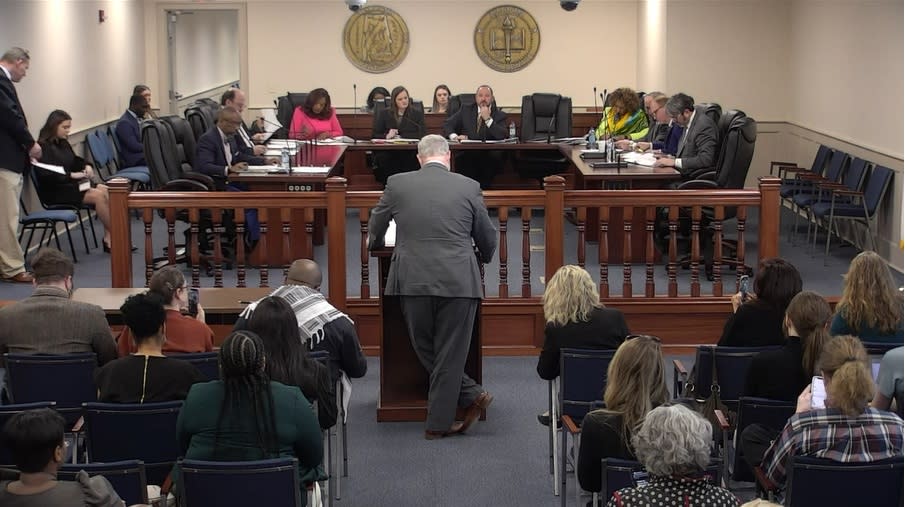Alabama Senate committee OKs ‘divisive concepts,’ anti-DEI legislation

- Oops!Something went wrong.Please try again later.
Sen. Will Barfoot, R-Pike Road (at podium) speaks on a bill that would ban the teaching of "divisive concepts" and publicly-funded diversity, equity and inclusion programs at a meeting of the Senate County and Municipal Government Committee on Feb. 21 2024 in Montgomery, Alabama. (Alabama Statehouse livestream)
An Alabama Senate committee Wednesday approved a bill that would ban public funding of diversity, equity and inclusion (DEI) initiatives and subject teachers or employees who use so-called “divisive concepts” to discipline or termination.
SB 129, sponsored by Sen. Will Barfoot, R-Pike Road, passed after an often emotional 90-minute public hearing in which supporters suggested the legislation was needed for academic freedom and opponents said it would hinder diversity initiatives and the teaching of Black history.
The legislation, following national conservative attacks on diversity programs and higher education, would ban teachers or state employees from making other people “affirm, adopt, or adhere” to a list of “divisive concepts.” The bill lists examples like “slavery and racism are aligned with the founding principles of the United States” and “individuals, by virtue of race, color, religion, sex, ethnicity, or national origin, are inherently responsible for actions committed in the past by other members of the same race, color, religion, sex, ethnicity, or national origin.”
GET THE MORNING HEADLINES DELIVERED TO YOUR INBOX
Barfoot’s legislation also bans public agencies from requiring employees to participate in a DEI program. Those who violate the act could lose their jobs or be subject to termination.
The senator said Wednesday he did not believe the legislation would inhibit the teaching of history. The bill includes language that the bill does not apply to teaching “topics or historical events in a historically accurate context.”
“You’ve seen other states certainly that have passed similar legislation for things that have gone on there,” Barfoot said. “There have been no unintended consequences in those states that I’m aware of.”
Supporters of the legislation, including conservative organizations, suggested that such programs were inherently oppressive.
“When you judge people by these concepts, or you make them apologize for these concepts, it’s very dehumanizing,” said Becky Gerritson, the director of the Eagle Forum, a conservative organization. “And it’s classifying people by characteristics they can’t help.”
John Eidsmoe, senior counsel for the Montgomery-based Foundation for Moral Law, an organization founded by former Alabama Chief Justice Roy Moore that has fought vaccine mandates, gun restrictions and what it calls “secret gender transition” in schools, said he was worried about divisiveness.
“We’re concerned about indoctrination and a particular ideology, an ideology that divides people into identity groups rather than measuring their individual worth, that teaches people to be ashamed of their race or their heritage and teaches them hatred of their ancestors,” he said.
Opponents said the legislation could subject teachers and employees to punishment for teaching widely-accepted historical facts, and accused sponsors of trying to stifle the teaching of Black history.
Jerome Dees, policy director for the Montgomery-based Southern Poverty Law Center, said as drafted, the bill could create problems for a teacher discussing historic racial discrimination in housing and banking if it was seen as “directing or compelling” a student to acknowledge what the law calls a divisive concept.
“If a teacher is talking about a particular topic, like Levittown or banking or what have you, and then provide a test on that that gets directly to racist principles, is it directing or compelling if a student decides ‘you know, I don’t want to believe that,’ and so they answer on a test otherwise and receive a failing grade?” he asked.
Camille Bennett, the executive director of Project Say Something, a nonprofit organization that focuses on Black history and combating racism, said the bill “could wipe out state-funded DEI and censor Black history.”
“How do a group of predominantly white men define divisive concepts?” she asked. “Were marginalized communities included in these definitions? Why does SB 129 choose not to explain why DEI is divisive? We still don’t know the reason.”
Democratic members of the committee, all of whom are Black, also questioned the bill and statements in support. Sen. Linda Coleman-Madison, D-Birmingham, was skeptical that the legislation would not affect history instruction.
“When we put things into law, it creates a fear,” she said. “And that fear is still there. Unintended consequences, I’m mighty afraid it is going to do that, because people are not going to be certain on what I can and what I cannot teach.”
Sen. Merika Coleman, D-Pleasant Grove, said the Legislature “needs DEI training,” and cited examples of inappropriate actions toward her, including an incident in 2017 when then-Rep. Lynn Greer, R-Rogersville, forwarded an email to his colleagues that Black legislators said was a racist insult.
“It makes us a better society to learn about other people’s history and backgrounds and other racial cultures, not a worse society,” she said. “And if you feel bad about what your ancestors did, that’s because they did wrong, not because somebody is trying to make you feel bad. It just is what it is, the history of this country.”
Sen. Kirk Hatcher, D-Montgomery, said he had told his 82-year-old mother that he felt they had fought these battles, and that she felt the need to “offer an apology for, I guess, not completing the work.”
“I’m paying attention to the people who came up to support the bill,” he said. “You are all nonmelinated folk. You say to us ‘This idea of diversity should not necessarily …’ Ma’am, I’m an educator. For God’s sake, don’t gaslight me.”
The bill passed 7-3, with Republicans all in support and Democrats all in opposition. It moves to the Senate, where Barfoot said he hopes to have a vote on Thursday. Senate Democrats have promised to filibuster the legislation if it reaches the floor.
The post Alabama Senate committee OKs ‘divisive concepts,’ anti-DEI legislation appeared first on Alabama Reflector.

